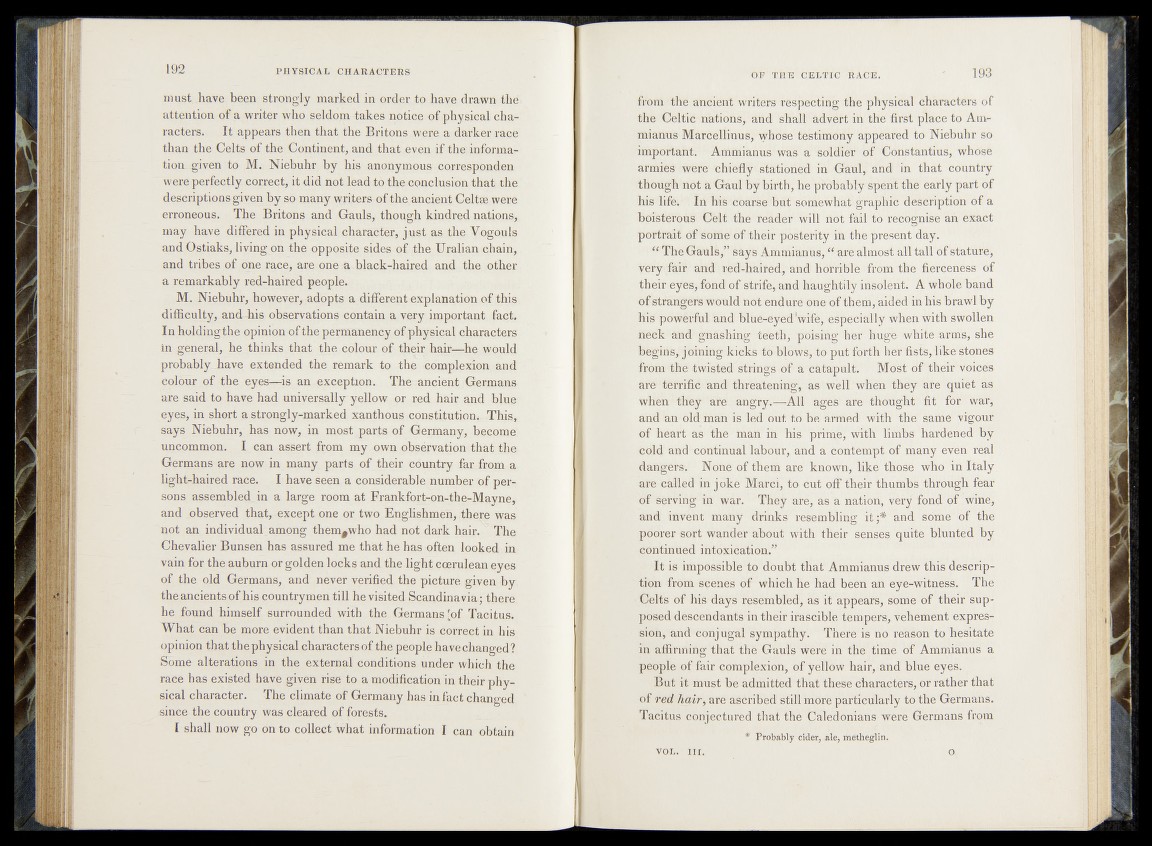
mast,.have been strongly marked in order to have drawn the'
attention of a writer who seldo,m-takes notice of physical characters.
It appears then that the Britons were a darker race
than th e Celts of the Continent, and that even if therinfonna-
tion-^iven to M. Niebuhr by his. anonymous corresponden
were perfectly, correct, it did not lead to the cqnclusion th a t the
descriptions given by so many writers-of the, ancient Cel tse were
erroneous. The Britons and Gauls, though kindred nations,,
may have differed in physical character, ju st as the Yogouls
and Ostiaks, living on the opposite sides of the Uralian chain,.,
and trpsea of one race, are one ?& black-haired and th e p th e r
a remarkably red-haired people.
M. Niebuhr, however, adopts a different explanation of this,
difficulty, and-his observations contain a very important fact,
In holding th&|piniqn of the permanency of physical characters
in general, he thinks that the colour, o f their hair—he ^ o u ld
probablyJiave extended the remark to the complexion and
colour of the eyes—is anexception. The^ancient fGer-mans
are said to have had universally yellow or red hair and blue
eyes, in short a strongly-marked xanthous constitution.. -This,
says Niebuhr, has now, in most ,parts of Germany,
uncommon. I can assert fpom my . own observationsthat thg.
Germans are now in many parts of their country far from a
light-haired race. I have seen a considerable number,;of .per-s
sons assembled in a large room at Frankfort-on-th e-Mayne,
and observed that, except one or two Englishmen, .there was
not an individual;among them^who had not dark hair. The
Chevalier Bunsen has assured me that he has often looked in
vain for the auburn or golden locks and the light ccerulean eyes
of the. old Germans, and never verified the picture given-by,
the ancients of his countrymen till he visited Scandinavia; there,
he found himself surrounded with the. Germans [of Tacitus.
What can be more evident than that Niebuhr is correct in his
opinion that the physical characters ofthe people have changed?;
Some- alterations in the external conditions under which the
race has existed have given rise to a modification in their physical
character. The climate of Germany has in fact changed,
since the country was cleared of forests.
I shall now go onto collect what information I can obtain
from the ancient writers respecting the physical characters of
the Oéltie natibhs, and shall advert in the first place to Atn-
mianus Marcellinus; whose testimony appeared to Niebuhr so
important. Ammianus'was a soldier of Constantius, whose
armies were chi’éfljó stationed in Gaul," and in that country
th oU ^ :nôt û;‘@âUÎ try birth, he pröbabiy spent the early part of
his life,- In his coarse but s^mewhat-.^raphic description of a
boisterous Celt the reader’ will 'nt»t fail to 'recognise an exact
portrait of some óf rthkir posterity in the present day.
“ The Gauls,” says Àmmianüs, “ are almost all tall of stature,
yerydfair and rëd-haired, and horiible from the fierceness óf
their eyes* fond" of strife, and haughtily ift^olenf. A whole band
of stranger's would not endure one bf tbedl, aided in his brawl by
his" powerful 'and blue-eyed ’wife, especially when with swollen
heck a’nd' gnashing teeth, p'bisffig Safer huge-Wvhite .arms, she
begins,joining' kicks to blows, dô p u t forth Her fists, like stones
from 4wilted strings of a catapulte’ Móst of their’voices
UieKferrific and threatening,'as vfèlfwhen 'IMdy^are qififet as
wHêU 'th e y ’ are angry.^All ^ g ^ ‘- ate thought fit for war,
and man is led^mt' fd be a rm e d ^ ith ?the same vigour
öf heart a s'th e man in *diis prime, with limbs hardened by
t5öl!d ‘ândHsontinual labour, ândr a contèmpt of many wen real
dangetsv None of them are known, like those who in Italy
are cAiled in jóke Marei, to cut off their thumbs through fear
óf serving in war. They are, as a nation’, very fond of wine,
and invent many drinks resembling it;* and some’'of the
poorer 'sort wander about with tnfeir sèmfes quite blunted by
Continued intoxication.”
It i£ impossible to iMibt that Ammianus drew this description
from sçehes óf which he had been an eyewitness' ..Th||
■ Celts of his-days resembled, as it appears, some of their supposed
descendants in their irascible tempefsy vehement expression,
and'conjugal Sympathy. Thefè is no to hesitate
in affirming‘that the Gauls Were'ifi the time of Ammianiis a
people of fair complexion, ó f ÿeîlow hair, and blue èÿëk.
But it must be admitted that these characters, or rather that
of red ho/ir, are ascribed' still more particularly to the Germans,'
Tacitus conjectured that thè Caledonians* WUre Germans frota
* Probably cider, .ale, metheglin.